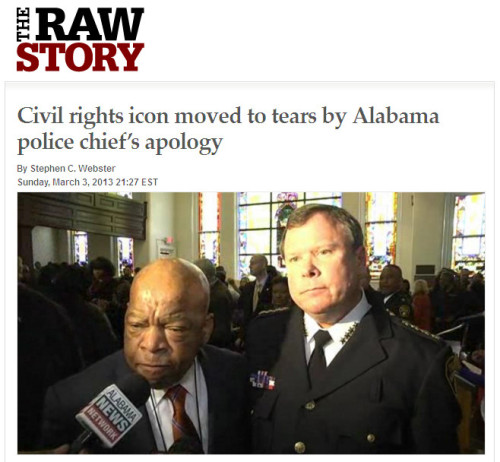Rep. John Lewis (R-GA) was moved to tears on Saturday by an apology from a police chief in Montgomery, Alabama, who said his department utterly failed to protect civil rights marchers as they disembarked from a Grayhound bus into a segregated terminal in 1961.
Lewis was one of 21 protesters who stepped off that bus and into an angry melee as more than 300 white southerners attacked the group with baseball bats and other blunt objects. Despite an order by U.S. Attorney General Robert Kennedy to protect these so-called “Freedom Riders,” police backed off in Montgomery and let the mob have its way.
Appearing with Lewis on Saturday after a symbolic march across the Edmund Pettus Bridge near Selma, Alabama — where 600 civil rights marchers were brutally attacked by police in 1965 — Montgomery Chief of Police Kevin Murphy formally apologized for the bus terminal incident and presented Lewis with his badge.
“It means a great deal,” Lewis said, according to MSNBC. “I teared up. I tried to keep from crying.”
it pays to point out that Chief Murphy was in no way responsible for what his predecessors did in ‘65. Yet he apologized anyway. And there’s a lesson here for anyone who’s ever argued “I didn’t do ____, that happened a long time ago. Why should I be held responsible for ____?”
They’re not being held responsible for the act, they’re being held responsible for the consequence. America’s history of slavery, segregation, and racism has left this a profoundly unequal society and that inequality benefits whites. You may not be responsible for the crimes of the past, but you benefit from them — whether those crimes are slavery or Native American genocide or the conquest of Mexican lands or any of a raft of other crimes. No one’s asking anyone to give anything back. No one’s asking anyone to be punished for anything. All that’s being asked is that people acknowledge a simple fact — that they would not be where you are today if it weren’t for the crimes of their forebears and that many of the privileges they take for granted come at the expense others who were less fortunate in the parentage sweepstakes.
It’s about looking at the world with a measure of realism and recognizing that history influences all of our lives, for good or for bad,






